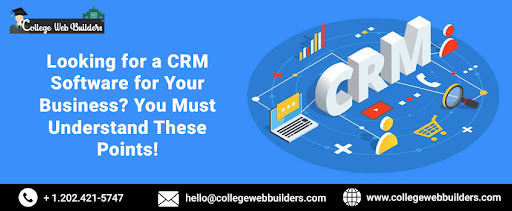
Looking for a CRM Software for Your Business? You Must Understand These Points!
We all know how much CRM can be useful for a business because it is helping businesses all around the world to increase their productivity by organizing everything and with automation. Businesses are outsourcing premium CRM software development but it's not that simple. There are a few points which everyone must understand to select the best for you. Before heading to these crucial points, let us know about the benefits of getting CRM software for your business.
Benefits of CRM Software
CRM (Customer Relationship Management) software offers numerous benefits for businesses of all sizes and industries. Here are some key pointers highlighting the advantages of implementing CRM software:
1) Enhanced Customer Relationships: CRM software centralizes customer data, interactions, and communication history in one place. This allows businesses to gain a comprehensive view of their customers and deliver personalized experiences. By understanding customer preferences, behaviors, and needs, businesses can build stronger relationships, provide targeted marketing campaigns, and deliver exceptional customer service.
2) Improved Sales and Revenue: CRM software streamlines sales processes by tracking leads, managing opportunities, and automating sales tasks. It provides sales teams with valuable insights into customer behavior and preferences, enabling them to identify cross-selling or upselling opportunities. Sales forecasting and pipeline management features in CRM software help businesses make data-driven decisions and optimize sales strategies, leading to increased conversion rates and revenue.
3) Efficient Marketing Campaigns: CRM software enables businesses to segment their customer base, target specific demographics, and create personalized marketing campaigns. By analyzing customer data, businesses can identify trends, preferences, and purchase patterns to tailor marketing messages and offers. CRM software also integrates with email marketing platforms, allowing for automated and targeted email campaigns, resulting in higher engagement and conversion rates.
4) Improved Customer Service and Support: CRM software enables businesses to provide efficient and effective customer support. With all customer data stored in one place, support teams can access relevant information quickly, allowing for faster issue resolution. CRM software also provides ticketing systems, knowledge bases, and chat functionalities, improving customer service experiences and fostering customer loyalty.
5) Increased Productivity and Efficiency: CRM software automates manual tasks, such as data entry, lead assignment, and follow-ups, reducing administrative workload and freeing up time for more strategic activities. It provides workflow automation, task management, and collaboration tools that optimize team productivity. Integration with other business systems, such as email clients and calendar applications, ensures smooth information flow and eliminates the need for duplicate data entry.
Tips For Getting The Best CRM Software For Your Business
Choosing the best CRM software development agency for your business is crucial for efficient customer management and maximizing productivity. Here are some valuable tips to help you in the process:
1) Define Your Business Needs: Before selecting a CRM software, clearly define your business requirements and goals. Identify the specific features and functionalities you need, such as contact management, lead tracking, sales forecasting, or customer support. Understanding your needs will guide you in selecting a CRM solution that aligns with your business objectives.
2) Consider Scalability: Choose a CRM software that can scale as your business grows. Consider factors such as the number of users, data storage capacity, and the ability to handle increasing customer data and interactions. Ensure that the CRM software can accommodate your future needs without requiring a significant overhaul or migration.
3) Integration Capabilities: Assess the integration capabilities of the CRM software. It should seamlessly integrate with your existing tools and systems, such as email marketing software, accounting software, or e-commerce platforms. This integration enables data synchronization and ensures a unified view of customer interactions across different touchpoints.
4) User-Friendly Interface: The CRM software should have an intuitive and user-friendly interface to facilitate adoption and minimize training time. Look for a system that offers a clean and organized dashboard, easy navigation, and a simple user interface. The ease of use will encourage team members to fully utilize the CRM software, enhancing its effectiveness.
5) Mobile Access: In today's mobile-driven world, ensure that the CRM software provides mobile access. Look for a solution that offers dedicated mobile apps or a responsive web interface. This enables your team to access and update customer data on the go, enhancing productivity and responsiveness.
6) Customization Options: Choose a CRM software that allows for customization based on your business processes and terminology. The ability to tailor the CRM to match your unique workflows and terminology improves user adoption and ensures that the software aligns closely with your business operations.
7) Data Security: Prioritize data security when selecting a CRM software. Consider factors such as data encryption, secure access controls, and compliance with data protection regulations. Look for CRM providers with a strong track record in data security and privacy to safeguard your sensitive customer information.
8) Vendor Support and Reputation: Research the reputation and support offered by the CRM software vendor. Read customer reviews, testimonials, and case studies to gauge the vendor's track record in customer support, system updates, and responsiveness to issues. Choose a vendor that provides excellent customer service, ongoing support, and regular software updates.
9) Pricing and Total Cost of Ownership: Evaluate the pricing structure of the CRM software and consider the total cost of ownership (TCO). Look beyond the initial license or subscription cost and factor in additional costs like implementation, customization, training, and ongoing support fees. Assess the value the CRM software brings to your business and ensure that the pricing aligns with your budget and ROI expectations.
10) Trial and Demo Periods: Take advantage of trial or demo periods offered by CRM software vendors. Test the software with a sample dataset and involve key team members in the evaluation process. This hands-on experience will help you assess the user experience, performance, and overall suitability of the CRM software for your business needs.
11) Consider Cloud-Based Solutions: Cloud-based CRM solutions offer numerous benefits such as easy accessibility, automatic software updates, scalability, and reduced IT infrastructure costs. Consider the advantages of a cloud-based CRM system and evaluate the security and reliability of the provider's cloud infrastructure.
12) Evaluate Reporting and Analytics: Robust reporting and analytics capabilities are crucial for gaining valuable insights from your CRM data. Assess the reporting features of the CRM software, such as customizable dashboards, predefined reports, and the ability to create ad-hoc reports. Advanced analytics capabilities like data visualization and predictive analytics can further empower your decision-making process.
Conclusion
Choosing the right CRM software for your business is a critical decision that can significantly impact your customer management and overall productivity. By following the tips mentioned above, you can make an informed choice and find a CRM solution that aligns with your specific needs and goals. Define your requirements, consider scalability and integration capabilities, prioritize user-friendliness and mobile access, and ensure data security. Evaluate customization options, vendor support, reputation, and pricing structures.
Take advantage of trial or demo periods to test the software firsthand. Additionally, consider cloud-based solutions and the reporting and analytics capabilities of the CRM software. By investing time and effort into selecting the best CRM software, you can streamline your operations, improve customer relationships, and drive business growth. Remember that the right CRM software is not just a tool, but a strategic investment that can contribute to your long-term success. Visit Collegewebbuilders.com to book an expert CRM consulting session and get the best custom CRM software development services in Ashburn VA for your business.
- Tags: Marketing, Onlline, Internet





